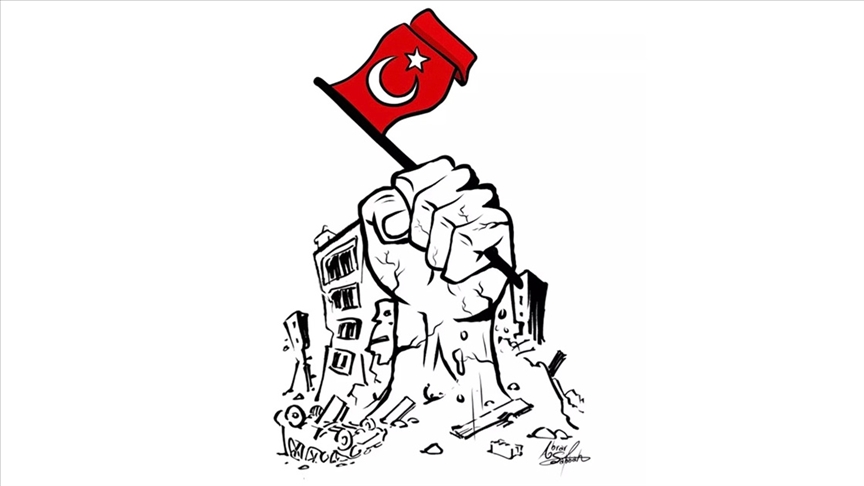Prophet Muhammad (pbuh) had his clerks write six letters of invitation to Islam after he had returned from Hudaibiyah. He sent these letters via his emissaries to prominent state leaders of that time (Muharram 7/May 628). Prophet Muhammad (pbuh) carefully selected emissaries from people who knew the region and the people that they would address; he selected people who had positive physical and moral attributes, who were skillful in terms of rhetoric and representation. Prophet Muhammad (pbuh) took diplomatic tradition into consideration and for the first time he had a seal made which read "Muhammad Rasulullah" (Muhammad, the Messenger of Allah), and the letters were sealed with this seal.
Two of these letters were sent to the Byzantine Empire and the Sassanian Empire, two great states and super powers of the time. In the Middle East at this time there was great competition between these two super powers, and it had been continuing for several centuries. The Sassanians had occupied Jerusalem in 614; they took the Holy Cross, which was very significant for the Christians, and brought it to their capital Madain (Ktesiphon); in 619 they invaded Egypt and reached the borders of Istanbul in 629 by crossing through Anatolia. The Byzantines were continuing their struggle against the Sassanians. In 627 Emperor Herakleios defeated the Sassanians' main army in Ninova and gained the ultimate victory.
The letter of Prophet Muhammad (pbuh) calling to Islam was brought to the Sassanian emperor Khusraw Parviz II by Abdullah ibn Khuzafa. Seeing that his name had been written after Prophet Muhammad (pbuh)'s name, Khusraw became incensed and tore up the letter. He asked his governor in San'a, Bazan, for some information about Prophet Muhammad (pbuh). Muhammad was notified that Khusraw had torn up his letter. He became sad and asked Allah to punish him for this shameful act. Not long after, this Bazan, the governor of Yemen, sent off two men to Medina. Prophet Muhammad (pbuh) learned that Khusraw Parviz had been killed by his son through a revelation. He told Bazan that if he became Muslim, he would be able continue his governorship. Upon this, Bazan and the people of Yemen became Muslims. Islam began to spread to Yemen with Bazan, the first Muslim governor of the area. Many Arabian tribes informed the Prophet that they had accepted Islam, sending delegations at different times.
Dihyah ibn Khalifa al-Kalbi was assigned to deliver the letter to the Byzantine emperor, Herakleios. The letter was composed of the following words, and is an example of other invitational letters:
"In the name of Allah, the Most Gracious, the Most Merciful. From Muhammad, servant and messenger of Allah, to Herakleios, Emperor of Rome;
Peace upon those who follow the Guidance. I invite you to Islam; accept Islam, you will be safe. Allah will grant you a two-fold reward; if you turn away, the sin of the wrong doings of all the people will be upon you. "O People of the Book: Come to an agreement between us and you; that we worship none but Allah, and that we shall associate no partners to Him, and that none of us shall take others for Lords besides Allah. And if they turn away, then say: Bear witness that we have surrendered to Him." (Al-i Imran 3/64).
Prophet Muhammad (pbuh)'s messenger Dihyah ibn Khalifa al-Kalbi met Herakleios at a time when Herakleios was returning victorious from war with Persia and had recaptured the cross which had been taken by the Persians when they had occupied Jerusalem. Herakleios had taken a vow to perform a pilgrimage to Jerusalem on foot and return the cross to its original place. It was he then that he received the latter. According to some accounts, Herakleios sought someone who could give him more information about Prophet Muhammad (pbuh). Abu Sufyan and his friends happened to be in Syria at the time and he was called before the Roman Emperor. Abu Sufyan gave a truthful version of the character of Prophet Muhammad (pbuh) and the message of Islam. Herakleios stated that the Abu Sufyan's words about Prophet Muhammad (pbuh) were in keeping with the features of a prophet. Herakleios gave presents to the emissary after welcoming him in accordance with diplomatic protocol.
The third letter was sent to Negus Ashama ibn Abjar, the king of Abyssinia with the emissary Amr ibn Umayya Ad-Damri. Ashama had treated the Muslims who had performed hijrah to Abyssinia before well, and he had refused to return them despite the request of the Quraishis. Ashama gave an affirmative answer to the invitation letter and accepted Islam. he sent various presents to Prophet Muhammad (pbuh). Upon Prophet Muhammad (pbuh)'s request, Ashama sent the last muhajirs in Abyssinia on a ship along with the emissary.
Prophet Muhammad (pbuh) sent the fourth letter with Hatib ibn Abu Baltaa to the high governor of Egypt, Muqawqis Jurayj ibn Mina. Hatib ibn Abi Baltaa gave him the letter and explained the basic teachings of Islam. Muqawqis did not accept Islam, but treated the envoy with respect and honor, sending some presents to Prophet Muhammad (pbuh) with a letter. These presents included two girls named Mariya and Sirin, a eunuch slave, 1,000 misqal of gold, a white mule, which came to be known as Duldul, precious dresses and cloths. Prophet Muhammad (pbuh) married Mariya, and Ibrahim was the child of this marriage.
The fifth letter was sent to Harith ibn Abu Shamir Al-Ghassani, the king of Ghassanis, with the emissary Shujah ibn Wahb al-Asadi. Harith became angry with this letter and threw it on the floor. He also threatened to strike Medina.
The sixth letter was sent to the ruler of the Banu Hanifa in Yamama, Houza ibn Ali Hanafi, with the emissary Sulait ibn Amr. Houza ibn Ali Hanafi was known for his poems and speeches. He treated the emissary with respect and gave him presents. However, he wrote a letter explaining that he did not accept Islam.
Prophet Muhammad (pbuh) sent these letters, which were written to convey the Islam, to many tribal leaders who were living in various regions of the Arabian Peninsula; he also sent some letters to individuals. These letters were written concisely and the addressees were referred to by their titles. No threatening or insulting remarks were placed in the letters. The addressees were only invited to bear witness that there is no god but Allah and Muhammad is His servant and His messenger. Particularly in the letters sent to the tribal leaders, it was stated that they could continue to live on their own lands if they accepted Islam; their lives and properties would be protected, the lands, fields or mining regions would be given over to some of the tribes. It was emphasized in particular that those who accepted Islam should obey Allah and Prophet Muhammad (pbuh), perform their prayers, and give zakat (charitable alms). In the letters written after the jizya verses (Al-Tauba 9/29), which was sent in the 9th year of the hijrah (630 AD), it was stated that jizya (a form of tax) would be taken from Jews, Christians and Zoroastrians who did not accept Islam although they recognized the sovereignty of the Muslims.
Subscribe to:
Post Comments (Atom)









Excellent piece of information, many thanks.
ReplyDelete